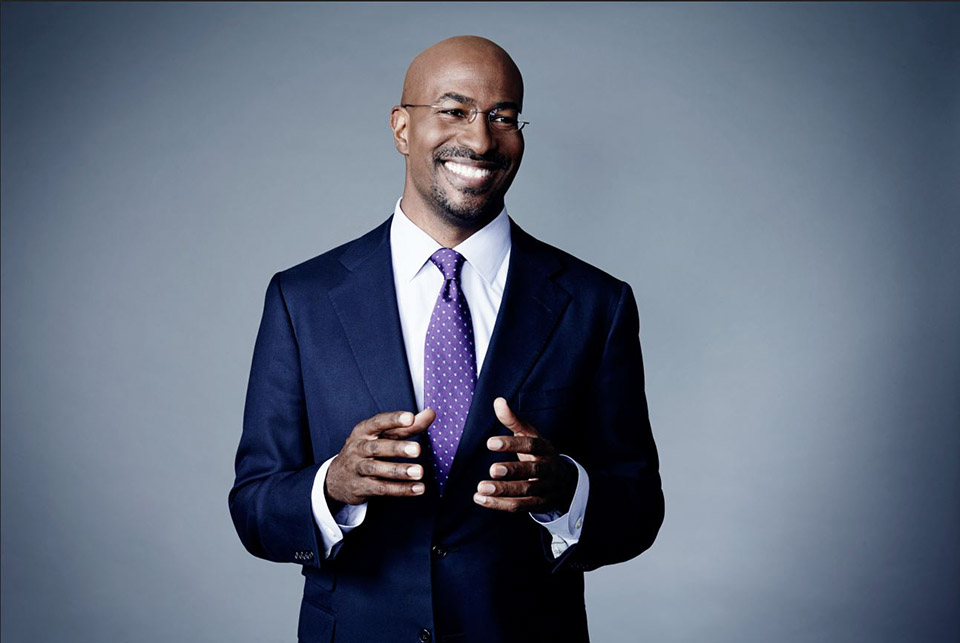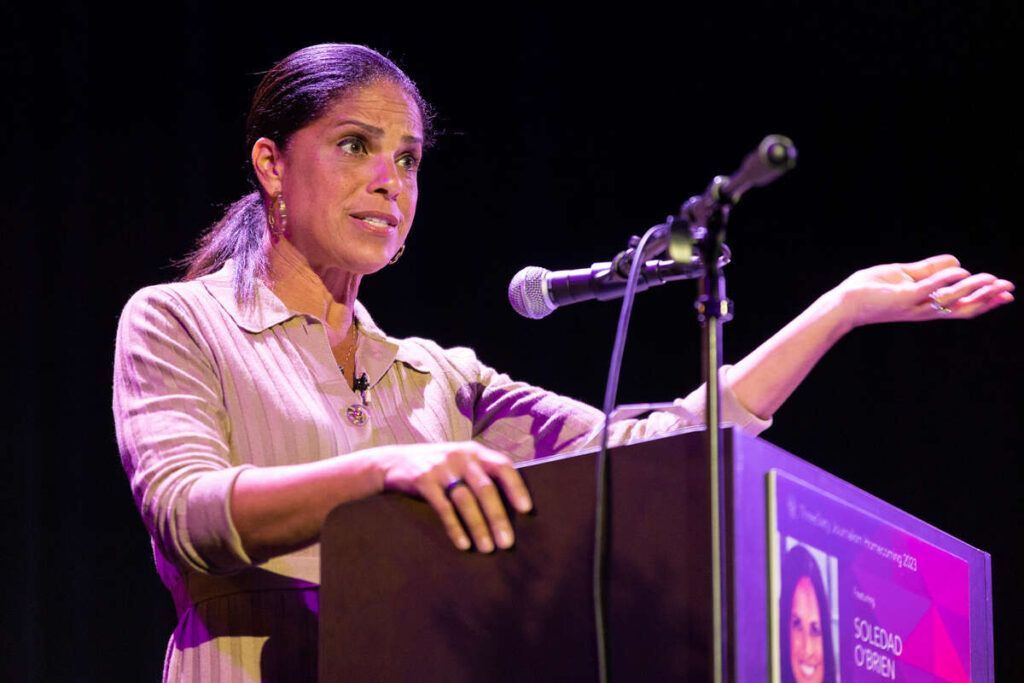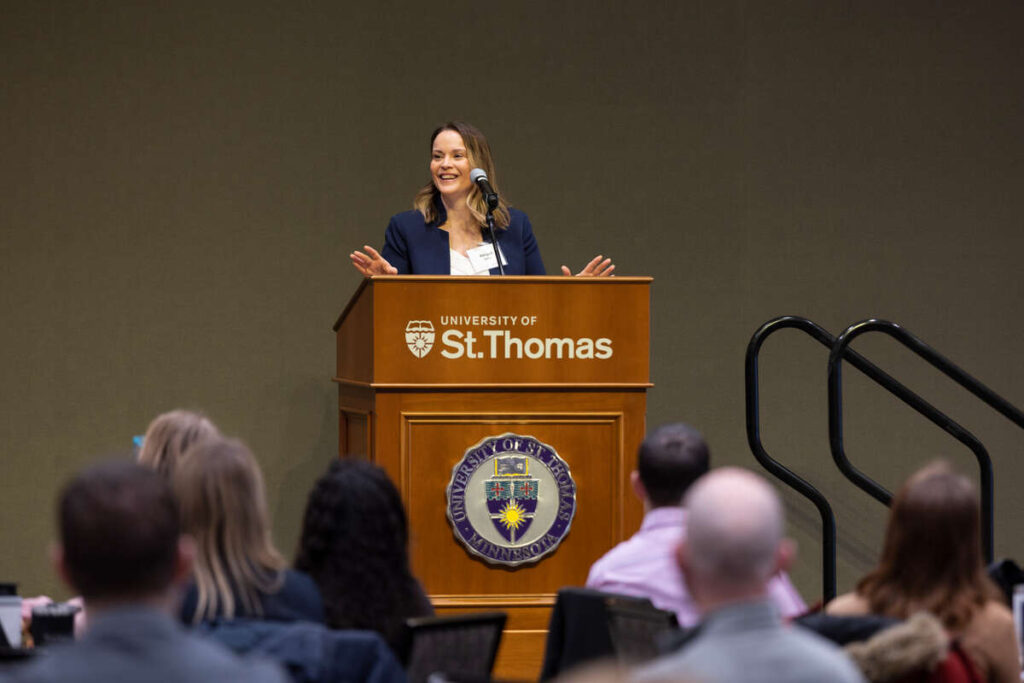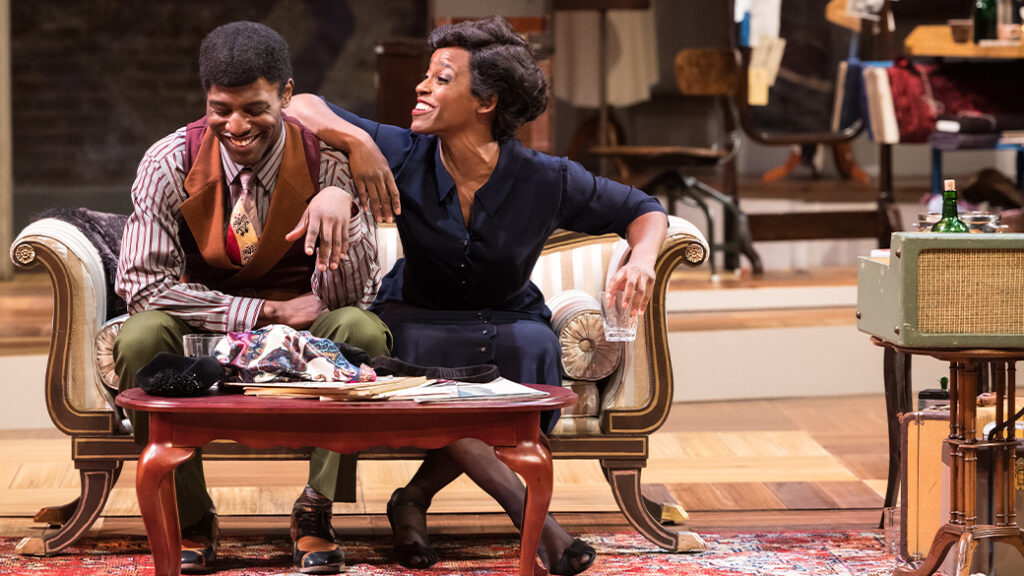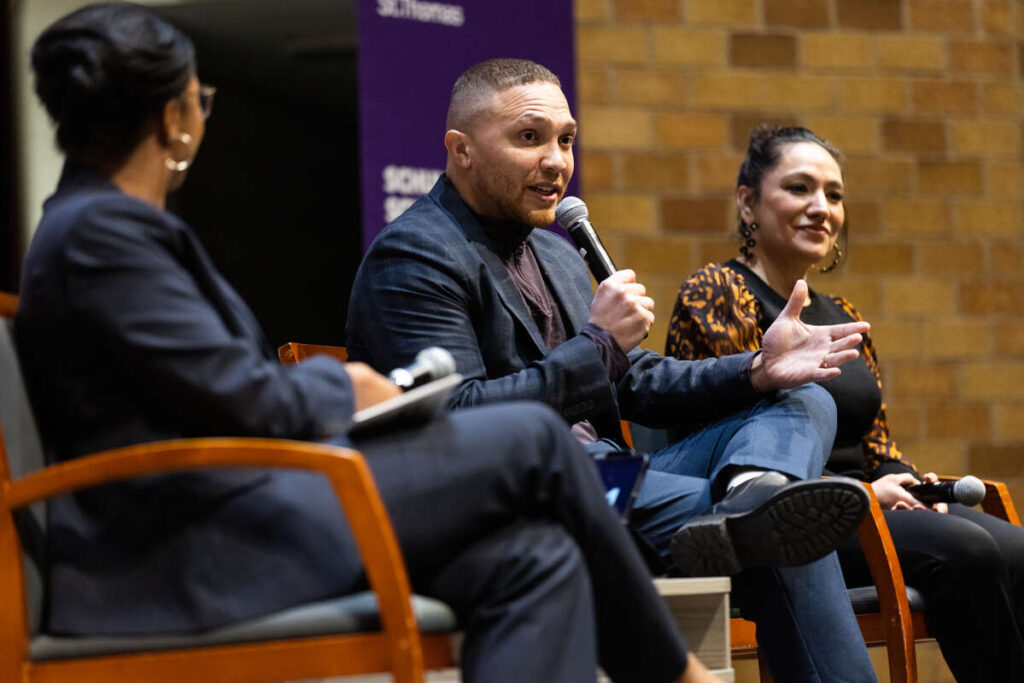More than 1,200 people from around the world have gathered at the Minneapolis Convention Center this week for the Forum on Workplace Inclusion’s 29th annual conference. Presenters from 40 states and 13 countries have helped round out dozens of seminars, working groups, coaching services and keynote speeches, including Wednesday’s keynote speech from CNN commentator Van Jones.
"The Forum on Workplace Inclusion is diversity Mecca," said Tiffany Jana, author of Overcoming Bias and the keynote speaker for Wednesday's lunch.
I stopped by the forum on Wednesday, and spoke with about a dozen people before Jones spoke and led a panel of experts on the topic of “Leading in a Time of Fear and Polarization.” Representing a vast range of corporations, government work, small businesses, nonprofits and the education sector, among others, the attendees expressed eagerness to learn from one another, gain more skills and expertise, and in general become stronger advocates and leaders around diversity and inclusion.
“I’m involved with supply chain management … and if you want return on investment and innovative services you should be diverse in how you source,” said Lamont Hames, president and CEO of LMH Strategies. “Diversity is a big issue, but it’s economic at the end of the day too. This conference appealed to me because it addresses that, as well as the human side of these issues.”
"It's interesting to see which traditional, large companies are coming to expand their views," he added.
Vance Okstad attended to better inform his role as a human resources adviser for the Duluth National Guard and the 148th Fighter Wing.
“This is such a good place to get a different and deeper understanding of diversity and inclusion,” Okstad said.
Sarah Khair traveled from Toronto and was hoping to help her company, Sun Life Financial, continue to evolve the diversity and inclusion strategy it refreshed in 2015.
“We have a great infrastructure in place and we’re hoping to find ways to implement it more deeply,” she said.
St. Thomas President Dr. Julie Sullivan welcomed the hundreds of people on hand for the day’s opening general session, introducing Jones and setting the stage for what would prove to be a spirited discussion.
“In these contentious and challenging times, it’s important for people of good faith to come together to learn how to respect our difference and find our common ground,” she said. “It is clear this year’s forum … is uniquely set up to help us find that path to common ground, for all of us assembled here and for all of us in our daily lives.”
From there, Jones and the panel (featuring Caroline Wanga of Target; Howard Ross of Cook Ross, Inc.; Jacob Rascon of NBC News; Miles Davis of Shenandoah University; and Tinna Nielsen of Move the Elephant for Inclusion) were off. Here are five observations from their talk.
Despite nearly three decades of the forum and many more years of work throughout the country, the work of advancing diversity and inclusion (D&I) remains difficult
Addressing the entire audience, Jones said simply: “I want to thank you guys for taking on the job you do. I wouldn’t do it. It is too hard.”
Comparing committee meetings surrounding D&I to defusing bombs, Jones said, “You don’t have a hazmat suit, a helmet. All you have is your heart and the skills you bring. If you have wild success, a year from now things will be much better and you will get no credit. … That’s success. If you mess up, you get triggered. If you commit the crime of being a human being in the middle of doing something difficult, you get all the barbs, bombs of 20, 30, 40 years of that person’s upbringings. … You got more issues than Time Magazine right in front of you. You don’t have someone you can turn to most of the time. Yet, the work you’re doing is the most important work in the country. We’ve never needed you more.”
Steve Humerickhouse, executive director of The Forum on Workplace Inclusion, seconded the importance of D&I work and the forum in the current political climate.
"The work we’re doing in diversity inclusion is more important now than it’s ever been. You can feel bad about the climate and be really upset, but … suddenly diversity is in the newspaper every single day. Every kind of diversity you can think of is in the news and people are talking about it," he said. "The work is more important than ever, and it becomes an issue of applying what we know to really make sure we’re taking advantage of this unique period in time. Van said, ‘I would not want to have your jobs,’ and yet, you have the unique opportunity now to really make a difference."
The current political discourse in the U.S. isn’t making anything easier
Pointing attention toward the model of political discourse seen on television like his network, CNN, Jones said, “Every conversation … has become all too often, I’m right, you’re wrong. I’m right, you’re wrong. Commercial break. We’re back. I’m right, you’re wrong. And it’s getting worse. Now it’s, we’re right, they’re wrong. We’re not even talking to each other, but about each other. That’s dangerous.”
Rascon, who covered both pro- and anti-Donald Trump rallies in Texas throughout the 2016 presidential campaign, had a unique view into what happens when you listen to people in person, not through the filter of your media.
“We cocoon ourselves and we can … put ourselves in these echo chambers and only hear from people who agree with us. That makes a different point of view more shocking,” he said. “I was stunned at the lack of intellectual diversity [throughout the election], even among my colleagues in all of news. We do a good job at a lot of places at being diverse in the color of our skin, but not intellectual diversity. … Because we’re so cocooned, when we’re exposed to other people it’s more of a shock.”
Instead of walling ourselves off into different-thinking tribes, advancing diversity and inclusion is based on the fact that…
It’s OK to disagree; we’re supposed to. How we have the conversation is what matters
Joking that people such as himself in the media get the benefit of taking good ideas developed by people like those gathered at the forum, Jones said we need to recognize the great value of disagreeing and interacting with people who see things differently than you do.
“In democracy, you’re supposed to disagree. That’s called freedom. It’s the greatest source of problem-solving in the world, when two different opinions can express themselves. You haggle, have thesis, antithesis, which gives you a synthesis. Two opposing ideas should give you a better idea because of the discussion, because of the debate. We don’t ever get to the synthesis any more,” Jones said. “We need a new conversation that’s not about I’m right and you’re wrong, but I want to understand and I want to be understood. That’s hard. Both are hard. You don’t have the words, the skills, the language. That’s why you’re so important. You’re figuring this stuff out, in real time, with real stakes, with real people, everyday. I know it’s hard, it’s frustrating. You come up against your own limitations every day.”
Finding common ground among different ideologies has become more difficult
Talking about the often under-acknowledged effect of people "becoming more tribal" because of the U.S.’s increasing diversity, Ross said it can only be expected.
“It’s a natural human progression of human beings. We are tribal, and as we have more and more people who are different around us we have a tendency to more tribal,” he said. “This notion that we as diversity practitioners have promoted often doesn’t take into account this other side of it (of people’s reaction to move more toward their tribe). We live in a myth that humans are rational. We’re not. … We’re blind to our own perspectives. That’s the deepest challenge we have.”
Nielsen said the biggest combatant to those natural inclinations are to avoid lumping people and their ways of thinking into ideological groups, but instead recognizing that each person is a unique individual.
“That us and them, they’re wrong and we’re right; you have to see the human being as part of that,” she said.
Luckily, there are ways for people to learn to recognize their natural ways of thinking and do something about it
Several panelists cited research showing decreasing levels of empathy in our society, which is an easy problem to see but harder to solve. Nielsen talked about playing a game inside your own head where, when having a conversation, you do your best to flip your perspective to something different (“What if the person saying this to me was a man and not a woman? How would I think of what they’re saying differently?”), which can move your thinking beyond the natural, reptilian tendencies of our brains. Ross spoke about the evolution from years ago when people tried to train others not to have bias, to now, when people instead can recognize that they have biases, acknowledge them and work to move past them.
